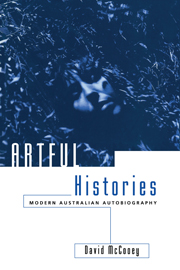Book contents
- Frontmatter
- Contents
- Acknowledgments
- Introduction
- 1 Autobiography and History
- 2 Beginnings: Histories and Families
- 3 Beginnings and Myth
- 4 Parents, Crisis and Education
- 5 The Hidden Past and Personal History
- 6 Autobiographies of Displacement
- 7 The Individual and Place
- 8 Fiction and Autobiography
- Conclusion
- Notes
- Select Bibliography
- Index
4 - Parents, Crisis and Education
Published online by Cambridge University Press: 05 March 2012
- Frontmatter
- Contents
- Acknowledgments
- Introduction
- 1 Autobiography and History
- 2 Beginnings: Histories and Families
- 3 Beginnings and Myth
- 4 Parents, Crisis and Education
- 5 The Hidden Past and Personal History
- 6 Autobiographies of Displacement
- 7 The Individual and Place
- 8 Fiction and Autobiography
- Conclusion
- Notes
- Select Bibliography
- Index
Summary
Once they stood
Tall in my childhood as the school, the steeple.
How can I judge without ingratitude?
Modern autobiographies are significantly different from their nineteenth-century predecessors in their degree of candour. This difference has not taken the form of candour about the various ‘private’ aspects of life that one may assume, such as sexuality. Until recently, such a topic was left largely unwritten in Australian autobiography; and even today few autobiographers practise the sort of confessional candour of Porter's The Watcher on the Cast-Iron Balcony. Neither are spouses much written about, although there are recent exceptions to this, such as Dorothy Hewett's Wild Card. Rather, parents are subjected to the public gaze more than before in modern autobiography. There are a number of reasons for this. There has been a shift in the importance of the family in the last hundred or so years, especially in the light of psychoanalytical claims. Also, the nuclear family has taken on a more extended and fundamental role. Also, it remains common (even in areas of rising life-expectancy) for autobiographers' parents to be dead by the time autobiographies are written; indeed, the death of a parent is often the impulse to write. In this mode, autobiography usually becomes an elegy for a lost parent or parents.
- Type
- Chapter
- Information
- Artful HistoriesModern Australian Autobiography, pp. 70 - 90Publisher: Cambridge University PressPrint publication year: 1996



